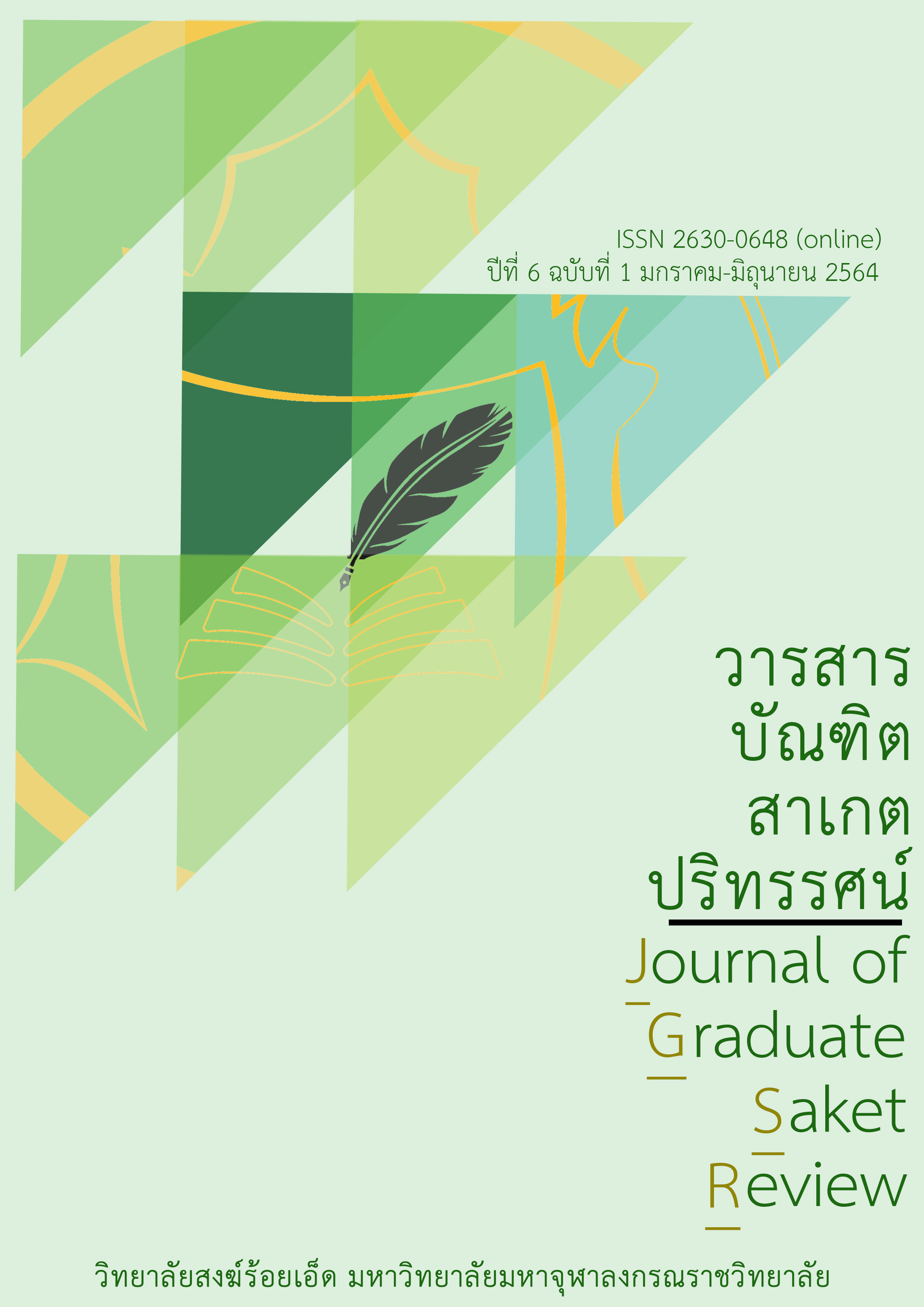วิเคราะห์การเคลื่อนไหวทางสังคมของกลุ่มผู้ชุมชุมขับไล่ระบอบทักษิณ ตั้งแต่ พ.ศ.2548-2557
Main Article Content
บทคัดย่อ
การเคลื่อนไหวทางการเมืองของกลุ่มผู้ชุมชุม ในช่วง พ.ศ.2548 - 2557 ได้เกิดคําถามว่า ทฤษฎีขบวนการเคลื่อนไหวทาง สังคมใช้กับสังคมไทยได้หรือไม่ บทความนี้จึงมีวัตถุประสงค์เพื่อศึกษาขบวนการเคลื่อนไหวทางการเมืองในการเมืองไทยจากกลุ่มพันธมิตรและกลุ่มผู้ชุมนุม “กปปส.” ช่วง พ.ศ. 2548-2557 โดยใช้วิธีการเก็บรวบรวมข้อมูลจากเอกสารและโดยใช้การตีความพรรณนาและวิเคราะห์ข้อมูลภายใต้โครงสร้างและบริบททางสังคมและการวิเคราะห์ภายใต้กรอบแนวคิดและทฤษฎีหรือพฤติกรรมของประชาชนในการเข้ามามีส่วนร่วมทางการเมือง ผลการศึกษาพบว่า การเคลื่อนไหวของกลุ่มพันธมิตรและกลุ่มผู้ชุมนุม “กปปส.” ช่วง พ.ศ. 2548 - 2557 เกิดจากสาเหตุหลายปัจจัยเช่น สาเหตุทางการเมือง เศรษฐกิจ และสังคม ก่อให้เกิดการสร้างอุดมการณ์ทางการเมืองชาตินิยมแบบ อนุรักษ์นิยมความเป็นไทย นําไปสู่เจตจํานงทางการเมือง การจัดโครงสร้างองค์กร ยุทธศาสตร์ ยุทธวิธีการ เคลื่อนไหว โดยเริ่มต้นจากสมัยวิกฤตการณ์สมัยรัฐบาลทักษิณ รัฐบาลสมชาย และรัฐบาลยิ่งลักษณ์ พร้อมบริบทและปัจจัยอื่น ๆที่เข้ามาสอดแทรกไม่ว่าจะเป็นกลุ่มอํานาจทางการเมือง เศรษฐกิจ ได้แก่ ชนชั้นนํา กองทัพ ตุลาการภิวัตน์ ระบบราชการ กลุ่มทุนดั้งเดิม เครือข่ายภาคประชาชน ภายใต้โครงสร้างสังคมวัฒนธรรมแบบเครือข่ายครอบครัว ก่อให้เกิดการไม่ยอมรับและปฏิเสธระบอบประชาธิปไตยแบบตัวแทน โดยมีสภาวะที่อยู่ซ่อนภายใต้โครงสร้างทางการเมืองของไทยคือรัฐเร้นลึกก่อให้เกิดการเปลี่ยนการเมือง โดยการ รัฐประหาร 19 กันยายน พ.ศ. 2549 การถอดถอนนายกรัฐมนตรีใน พ.ศ. 2551 และการรัฐประหาร 22 พฤษภาคม พ.ศ. 2557 ซึ่งได้ทําลายความเข้มแข็งของการเมืองภาคประชาชน หลักประกันสิทธิเสรีภาพของประชาชนในระยะยาว
Article Details
เนื้อหาและข้อมูลในบทความที่ลงตีพิมพ์ในวารสารบัณฑิตสาเกตปริทรรศน์ ถือเป็นข้อคิดเห็นและความรับผิดชอบของผู้เขียนบทความโดยตรงซึ่งกองบรรณาธิการวารสาร ไม่จำเป็นต้องเห็นด้วย หรือร่วมรับผิดชอบใด ๆบทความ ข้อมูล เนื้อหา รูปภาพ ฯลฯ ที่ได้รับการตีพิมพ์ในวารสารบัณฑิตสาเกตปริทรรศน์ ถือเป็นลิขสิทธิ์ของวารสารบัณฑิตสาเกตปริทรรศน์ หากบุคคลหรือหน่วยงานใดต้องการนำทั้งหมดหรือส่วนหนึ่งส่วนใดไปเผยแพร่ต่อหรือเพื่อกระทำการใด ๆ จะต้องได้รับอนุญาตเป็นลายลักอักษรจากวารสารบัณฑิตสาเกตปริทรรศน์ ก่อนเท่านั้น
เอกสารอ้างอิง
กัญญา โพธิวัฒน์. (2548). ทีมผู้นำการเปลี่ยนแปลงในโรงเรียนประถมศึกษา: การศึกษาเพื่อสร้างทฤษฎีฐานราก. วิทยานิพนธ์ปริญญาปรัชญาดุษฎีบัณฑิต. สาขาวิชาการบริหารการศึกษาบัณฑิตวิทยาลัย มหาวิทยาลัยขอนแก่น.
เกษียร เตชะพีระ. (2554). ระบอบประชาธิปไตยอันมีพระมหากษัตริย์ทรงเป็นประมุข: ที่มาและที่ไป. ในเมืองไทยสองเสี่ยง? : สภาพปัญหา แนวโน้ม และทางออกวิกฤติการเมืองไทย. กรุงเทพฯ: คณะรัฐศาสตร์ มหาวิทยาลัยธรรมศาสตร์ .
ธิบดี บัวคําศรี. (2556). บทวิจารณ์หนังสือ: พวงทอง ภวัครพันธุ์ รัฐและขบวนการอนารยะสังคมไทยในกรณีปราสาทพระวิหาร. วารสารสังคมลุ่มน้ำโขง, 9(3), 167-173.
นภาภรณ์ หะวานนท์ และคณะ. (2543). การศึกษาเงื่อนไขความสำเร็จในการดำเนินงานของคณะกรรมการโรงเรียน. กรุงเทพฯ : สำนักงานคณะกรรมการการประถมศึกษาแห่งชาติ.
ประจักษ์ ก้องกีรติ. (2554). ประชาสังคม ความรุนแรง และการล่มสลายของประชาธิปไตย: ความสำคัญของแนวคิดเรื่องความมีอารยะและการเมืองแบบอารยะของเอ็ดเวิร์ด ชิลส์ ใน เมืองไทยสองเสี่ยง? : สภาพปัญหา แนวโน้ม และทางออกวิกฤติการเมืองไทย. กรุงเทพฯ: คณะรัฐศาสตร์มหาวิทยาลัยธรรมศาสตร์.
พิทักษ์ ศิริวงศ์. (2547). ทฤษฎีฐานราก (Grounded Theory ) วิธีวิทยาการวิจัยเพื่อสร้างทฤษฎีในการพัฒนาประเทศ. บรรณสาร มศก.ท, 19(1).
อัสมา หวังกุหลํา. (2553). บทบาททางการเมืองของชนชั้นกลางไทยในขบวนการพันธมิตรประชาชนเพื่อประชาธิปไตยภายใต้ระบอบทักษิณ. วิทยานิพนธ์ปริญญารัฐศาสตรมหาบัณฑิต จุฬาลงกรณ์มหาวิทยาลัย .
เออเจนี เมริโอ. (2559) รัฐเร้นลึกในไทย พระราชอำนาจ และศาลรัฐธรรมนูญ (พ.ศ.2540-2558), แปลจาก Thailand's Deep State, Royal Power and Constitutional Court (1997-2015), Journal of Contemporary Asia 46(3), 2016, 445-466. แปลโดย วีระ อนามศิลป์ วารสารฟ้าเดียวกัน, 14(1),13-16.
Dale Scott, P. (2008). The Road to 9/11, Wealth, Empire, and the Future of America. Berkeley:
University of California Press.
Escobar A. & Sonia E. Avarez, e. (1992). The Making of Social Movement in Latin America. New York: Routledge
Glaser, B. G., & Strauss A. L. (1967). The discovery of grounded theory: Strategies for qualitative research. Chicago: Sociology Press.
Leedy,P.D.,& Ormrod,J.E. (2001). Practical Research: Planning and Design. 7th ed. New Jersey: Prentice-Hall, Inc.
Paxton, R. (2004). The Anatomy of Fascism. New York: Random House.
Touraine, A.Translated by D. Macey. (2001). Beyond Neoliberalism. Cambridge : U.K Polity press,
Shangmao CHEN. (2021). The Political Economy of Internationalization of Thailand Higher Education. School of Administrative Studies Academic Journal, 4 (1), 140-158.
Strauss, A., & Corbin, J. (1998). Basics of qualitative research: Techniques and procedures fordeveloping grounded theory. 2nd ed. California: SAGE.


